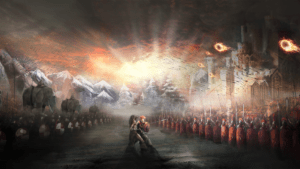Common theological caricatures portray Satan as the supreme ruler of hell, while God remains localized in heaven. However, a theological graduate student recently posed the random question, If God is truly omnipresent, is He in hell? Simply put, Yes.
Although many will find it odd to think of God being present in hell, it seems God’s omnipresence necessitates this by definition. Imposing locational limits upon God is to imply imperfection, while simultaneously eroding the foundation for the doctrine of God’s omnipresence. If God is not present in hell, then God is not omnipresent. Conversely, if God is omnipresent, then He must be present everywhere—including hell. Unsurprisingly, David unambiguously affirms God’s omnipresence, even recognizing His presence in hell, writing, “If I go up to heaven, You are there; if I make my bed in Sheol, You are there” (Psalm 139:8; HCSB).1 Profoundly, James Montgomery Boice comments, “The highest point to which we can rise is heaven and God is obviously there, and the lowest point to which we can descend is hell (the Hebrew word is Sheol) and God is there too. . . . the thing that makes hell so terrible is that it is run by God.”2
However, other biblical passages suggest the damned are cast away from God’s presence (cf. 2 Thessalonians 1:9), presenting an apparent contradiction. Nevertheless, theologian William G.T. Shedd reconciles both types of passages, commenting, “Divine omnipresence means the presence of all things to God, rather than God’s presence to all things. They are in his presence, but he is not in their presence.”3 Shedd’s explanation makes an important distinction, highlighting God’s ability to be present, but not manifest in the lives of many. Theologian Kevin Alan Lewis uses an analogy of radio waves to demonstrate this concept. While electronic communication waves are ever-present in our environment, they remain indiscernible without correctly calibrated, specialized equipment. In other words, radio waves are present, but not manifest. Similarly, God is present in hell but remains entirely indiscernible for hell’s inhabitants.
- It is important to note, Sheol means, "the place of the dead," and is not always a reference to hell specifically. For a more detailed explanation of Sheol, see Walter A. Elwell, Evangelical Dictionary of Theology, 2nd ed. (Grand Rapids, MI: Baker Academic, 2001), 1098.
- James Montgomery Boice, Psalms 107–150: An Expositional Commentary (Grand Rapids, MI: Baker, 2005), 1204-1205.
- William G.T. Shedd, Dogmatic Theology: Third Edition, ed. Alan W. Gomes, (Phillipsburg, NJ: Presbyterian and Reformed Publishing, 2003), 278.




